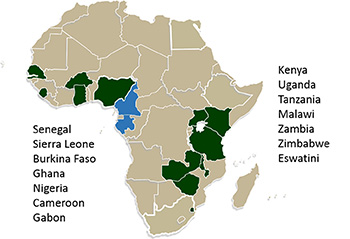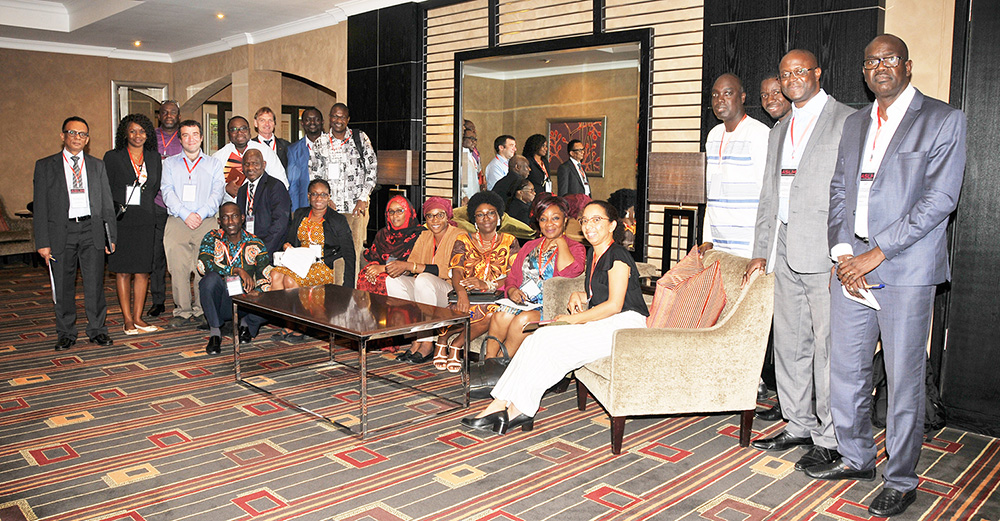Fleming Fund Program Expands Activities to Central Africa with the Regional EQA Grant (EQAFRICA)
 In alignment with the Global Action Plan on Antimicrobial Resistance objective to build sustainable national systems for improved surveillance, the United Kingdom-based Fleming Fund has allocated funding to a variety of grant schemes (fellowship, country, regional) to tackle the emergence of antimicrobial resistance (AMR) in low- and middle-income countries. Originally targeting 12 priority countries across Southern, Eastern and Western Africa, the program has expanded its activities to central Africa with the inclusion of Cameroon and Gabon to the recently approved portfolio of grants led by the African Society for Laboratory Medicine (ASLM). The inclusion of central African countries was advocated by the Africa Centres for Disease Control and Prevention (CDC), on the basis of equity across the four sub-Saharan African regions. Currently, ASLM leads the Mapping of AMR and AMU data in Africa (MAAP) consortium; the External Quality Assessment for Africa (EQAFRICA); the Fleming Fellowship in Tanzania; and is engaged in the regional grant on workface development for AMR.
In alignment with the Global Action Plan on Antimicrobial Resistance objective to build sustainable national systems for improved surveillance, the United Kingdom-based Fleming Fund has allocated funding to a variety of grant schemes (fellowship, country, regional) to tackle the emergence of antimicrobial resistance (AMR) in low- and middle-income countries. Originally targeting 12 priority countries across Southern, Eastern and Western Africa, the program has expanded its activities to central Africa with the inclusion of Cameroon and Gabon to the recently approved portfolio of grants led by the African Society for Laboratory Medicine (ASLM). The inclusion of central African countries was advocated by the Africa Centres for Disease Control and Prevention (CDC), on the basis of equity across the four sub-Saharan African regions. Currently, ASLM leads the Mapping of AMR and AMU data in Africa (MAAP) consortium; the External Quality Assessment for Africa (EQAFRICA); the Fleming Fellowship in Tanzania; and is engaged in the regional grant on workface development for AMR.
In the scope of the newly launched Fleming Fund External Quality Assessment-Africa (EQAFRICA) regional grant, a two-day regional workshop was held on 10-11 February in Johannesburg, South Africa. The meeting was co-convened by ASLM and Africa CDC, and hosted by the South Africa National Institute for Communicable Diseases (NICD). Representatives from Fleming priority countries, as well as Cameroon and Gabon, and prospective new external quality assessment (EQA) providers, including the African Medical and Research Foundation (AMREF), Institut Pasteur de Dakar, Centre Pasteur Abidjan, were invited. This meeting also gathered global health agencies, including the World Health Organization, the Food and Agriculture Organization (FAO), the World Organisation for Animal Health (OIE)), and various laboratory stakeholders across the One Health sector.
The meeting aimed to explain the overall aim of the project and elicit engagement from countries and stakeholders. More specifically, the discussion focused on:
- understanding country needs, best practices and challenges in terms of EQA for AMR;
- Discuss the significance and implications of the current EQA program availability, coverage, uptake and sustainability at continental level;
- Identify areas of synergy and collaboration with existing initiatives on the continent;
Plenary discussions and breakout sessions were organized to gather inputs and feedback from participants. Consensus emerged that EQA participation needs to be embedded within the effective implementation of laboratory quality management systems (LQMS) supported by national policies and regulations to achieve the expected impact to ‘guide and optimize antibiotic prescription and use to limit AMR’. It was agreed that sustainable domestic resources allocated to laboratory infrastructure, reagents, etc. should be a prerequisite for successful implementation of EQA programs at the regional and national level.
 Key recommendations from Members States to Africa CDC, ASLM and the health bodies of the African regional economic blocs, the Economic Community of Central African States and Central African Economic and Monetary Community, included:
Key recommendations from Members States to Africa CDC, ASLM and the health bodies of the African regional economic blocs, the Economic Community of Central African States and Central African Economic and Monetary Community, included:
- Expand EQA provision capacity beyond services offered by NCID and WHO EQA programs to achieve increased coverage of Africa’s national reference bacteriology laboratories;
- Develop enabling national policies and regulations promoting the uptake of EQA programs as part of routine laboratory quality management activities across The One Health sector;
- Advocating at the level of Heads of States, Ministries of Health, Agriculture and environment for the mobilization of domestic resources supporting compliance to national laboratory quality norms, participation in EQA and implementation of corrective actions as part of the laboratory licensing system.

The outcomes of the meeting were consolidated and fed into the design of a full grant proposal to enable the implementation of the regional AMR EQA program as part of the Fleming Fund regional grant between 2020 and 2021. Representatives of participating central Africa Member States have expressed their eagerness to contribute to the fight against AMR as part of this regional initiative.
Author: Dr Marguerite Massinga Loembé
Editor: Mrs Bethanie Rammer
About ASLM
Established in 2011, the African Society for Laboratory Medicine (ASLM) is a pan-African professional body focused on improving healthcare by strengthening all aspects of laboratories including workforce strengthening, quality improvement and accreditation, harmonization of regulations, strengthening of networks, and strengthening advocacy and communications. Laboratory testing is pivotal for disease diagnosis, epidemiological surveillance, outbreak investigation, and initiation and monitoring of treatment, as well as research and development. ASLM addresses these challenges by working collaboratively with governments; national, regional and international organizations; implementing partners, the private sector and other agencies to achieve its Strategic Vision goals. ASLM is endorsed by the African Union with support from the World Health Organization, Africa CDC, the US CDC, the US President’s Emergency Plan for AIDS Relief, the World Bank, the Clinton Foundation, UNAIDS, and others.
